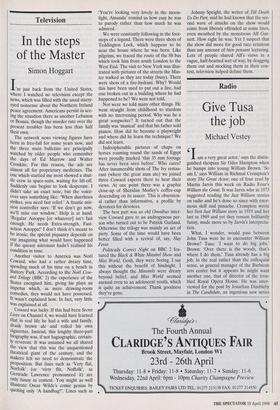Television
In the steps of the Master
Simon Hoggart
I'm just back from the United States, where I watched no television except the news, which was filled with the usual starry- eyed nonsense about the Northern Ireland peace agreement. Americans persist in see- ing the situation there as another Lebanon or Bosnia, though the murder rate over the present troubles has been less than half their own.
The network news viewing figures have been in free-fall for some years now, and the three main bulletins are principally watched by older people who remember the days of Ed Murrow and Walter Cronkite. For this reason, the ads are almost all for proprietary medicines. The one which startled me most showed a shut- tle crew in space-suits, waiting for lift-off. Suddenly one begins to look desperate. I didn't take an exact note, but the voice- over says something like: 'When diarrhoea strikes, you need fast relief.' A frantic mis- sion controller says: `If we don't go now, we'll miss our window.' Help is at hand. `Regular Astoppa [or whatever] isn't fast enough. He needs Extra-strength, Fast- action Astoppa!' I don't think it's meant to be ironic; the special piquancy depends on our imagining what would have happened if the queasy astronaut hadn't realised his condition in time.
Another visitor to America was Noel Coward, who had a rather dreary time, spending much of his time on a bench in Battery Park. According to the Noel Cow- ard Trilogy (BBC 2) the experience of the States energised him, giving his plays an impetus which, as mere drawing-room comedies, they would not have possessed. It wasn't explained how. In fact, very little was explained at all.
Coward was lucky. If this had been Secret Lives on Channel 4, we would have learned that in real life he had a wife and family, drank brown ale and rolled his own cigarettes. Instead, this lengthy three-part biography was, if not hagiographic, certain- ly reverent. It was assumed we all shared the view that this was the unquestioned theatrical giant of the century, and the makers felt no need to demonstrate the proposition. But lines such as 'Very flat, Norfolk' (or `virry flit, Noffolk', as Gertrude Lawrence pronounced it) are only funny in context. You might as well illustrate Oscar Wilde's comic genius by quoting only 'A handbag?'. Lines such as `You're looking very lovely in the moon- light, Amanda' remind us how easy he was to parody rather than how much he was admired.
We were constantly following in the foot- steps of a legend. There were three shots of Teddington Lock, which happens to be near the house where he was born. Like pilgrims, we traced the route of the 88 bus which took him from south London to the West End. The visit to New York was illus- trated with pictures of the streets the Mas- ter walked as they are today (busy). There were shots of a fire-hydrant. Why? Would this have been used to put out a fire, had one broken out in a building where he had happened to be? We were not told.
Nor were we told many other things. He went straight from childhood to stardom with no intervening period. Why was he a great songwriter? It turned out that the family was 'musical' and that his father sold pianos. How did he become a playwright and where did he learn the technique? We did not learn.
Indecipherable pictures of chaps on horses roaming round the sands of Egypt were proudly marked 'this 35 mm footage has never been seen before'. Who cares? After innumerable shots of The Ivy restau- rant (where the great man ate) we joined three Coward experts there to hear their views. At one point there was a graphic close-up of Sheridan Morley's coffee-cup descending on its saucer. This is obsession- al rather than informative, a profile by devotees for devotees.
The best part was an old Omnibus inter- view Coward gave to an androgynous per- son who turned out to be Patrick Garland. Otherwise the trilogy was mainly an act of piety. Some of the time would have been better filled with a revival of, say, Hay Fever.
Politically Correct Night on BBC 2 fea- tured the Black & White Minstrel Show and Miss World. Gosh, they were boring. I say this without the benefit of hindsight. I always thought the Minstrels were dreary beyond belief, and Miss World seemed asexual even to an adolescent youth, which is quite an achievement. Thank goodness they've gone. Johnny Speight, the writer of Till Death Us Do Part, said he had known that the sec- ond wave of attacks on the show would come from liberals offended at some lines, even mouthed by the monstrous Alf Gar- nett. How right he was. Yet I suspect that the show did more for good race relations than any amount of bien pensant lecturing. Lots of people shared Alf' s views in a vague, half-hearted sort of way; by dragging them out and mocking them in their con- text, television helped defuse them.


























































 Previous page
Previous page